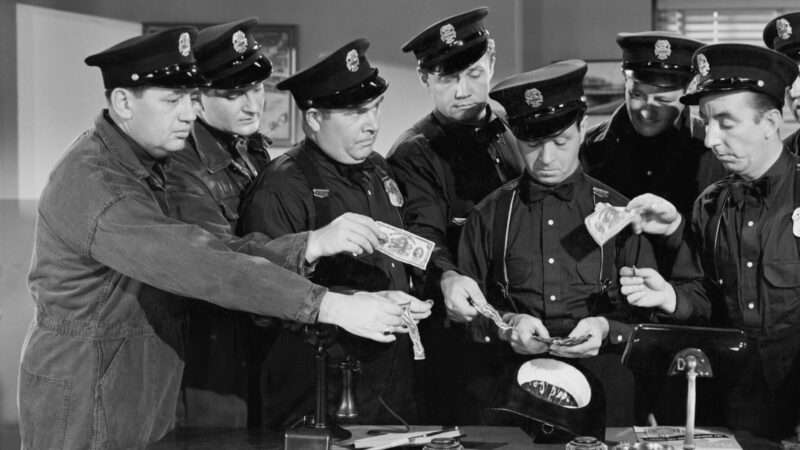

During the seemingly endless run-up to the last election, my partisan friends would often say to me, "politics is binary." Their point is that voters only have two serious choices in any election, the Democrats or the Republicans. We need to pick a side and then, apparently, serve as cheerleaders for whatever that side is doing.
As a libertarian who doesn't like either choice, I often scream in frustration. Baltimore Journalist H.L. Mencken succinctly captures my view of the reigning Democrats and Republicans: "Under democracy one party always devotes its chief energies to prove that the other party is unfit to rule—and both commonly succeed, and are right." He believed that our political history is "simply a record of vacillations between two gangs of frauds."
Few issues capture the fraudulent nature of modern politics more than civil-asset forfeiture. If I had a dime for every time a national politician mentions the Constitution, I could retire tomorrow along the California coast. My pockets would be empty if I collected that dime every time those same politicians demanded the reform of that forfeiture system that wantonly violates the Constitution's principles.
Civil forfeiture laws allow police agencies to seize Americans' homes, cars, and cash upon the suspicion that someone used the property in criminal activity—and without due process afforded to its owner. The courts file cases with odd names such as, "The United States Government v. a 2017 Ford Explorer." The government targets the property—then forces owners to prove their innocence to get it back (and it's a long and costly process to do so).
One need only do a little Google research to find endless appalling examples. In one Anaheim case, city and federal officials attempted to seize a $1.5 million commercial building after cops accused one of the owner's tenants of illegally selling $37 worth of marijuana. Prosecutors ultimately dropped that case amid bad publicity, but California officials grab $100 million a year in such takings.
Most comes from ordinary (and usually low-income) people, not drug kingpins. If, let's say, someone steals your $40,000 SUV and uses it in a drug deal, police can keep the vehicle because it—and not you—was involved in a crime. If you're pulled over for speeding and police find $10,000 in cash in the glove compartment, they can assume that the money came from illegal activity and take it—even if it came from a legitimate transaction.
Many states have passed asset-forfeiture reform on a bipartisan basis. Recently, Arizona's House of Representatives passed, on a 57-2 vote, a bill that would require that police obtain a conviction for an underlying crime before depriving people of their property. California passed a similar law in 2016. The Legislative Analyst's Office has struggled to monitor its results because police agencies haven't fully complied with its reporting requirements.
Unfortunately, state reforms aren't enough because police agencies have concocted a clever workaround. They take people's assets, then "partner" with federal agencies, which operate under a much broader standard. Then they split the loot. The problem is that the system provides perverse financial incentives.
"In the federal system and most states, the property that is seized and forfeited is not delivered to the federal or state treasuries, but instead is kept by the law enforcement agencies themselves," argued a variety of liberal and conservative groups (including my employer) in a recent letter to Congress. They called for simple reforms—sending proceeds to the general treasury, eliminating partnering programs, and adding judicial oversight.
Both parties have terrible records on the topic. Despite his support from progressives who champion criminal-justice reform, President Joe Biden is the architect of the key drug-war law that set asset forfeiture loose on the general public. The Trump administration's last two attorney generals (William Barr and Jeff Sessions) argued for expanded use of it. Democrats and Republicans are frauds on this issue, so it's time for public pressure.
Police agencies insist that civil forfeiture laws are an important tool in fighting against drug cartels, but they rely solely on conjecture rather than data to make that case. When California was debating its reform, its police opponents publicly opposed it mainly because of what it might do to their budgets. Cry me a river on that one.
"It may be the oldest question in politics: what makes government legitimate?" wrote Timothy Sandefur, in a new report about asset forfeiture for the Arizona-based Goldwater Institute. "Or as the Christian thinker St. Augustine put it some 1,500 years ago, what distinguishes a state from a gang of criminals?…A government serves justice, not the private advantage of those in charge."
If partisans ever set aside their political grudge matches for a moment, they might find common ground on reforming this unconstitutional system. Our political system might be binary, but here's a good chance for some singularity.
This column was first published in The Orange County Register.
Read Entire Article Here: Reason Magazine Articles
via IFTTT
